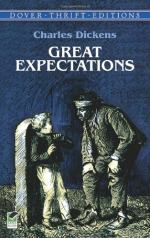“It serves you right,” said Wemmick, “Get out.”
So the unfortunate Mike very humbly withdrew, and Mr. Jaggers and Wemmick appeared to have re-established their good understanding, and went to work again with an air of refreshment upon them as if they had just had lunch.
Chapter 52
From Little Britain, I went, with my cheque in my pocket, to Miss Skiffins’s brother, the accountant; and Miss Skiffins’s brother, the accountant, going straight to Clarriker’s and bringing Clarriker to me, I had the great satisfaction of concluding that arrangement. It was the only good thing I had done, and the only completed thing I had done, since I was first apprised of my great expectations.
Clarriker informing me on that occasion that the affairs of the House were steadily progressing, that he would now be able to establish a small branch-house in the East which was much wanted for the extension of the business, and that Herbert in his new partnership capacity would go out and take charge of it, I found that I must have prepared for a separation from my friend, even though my own affairs had been more settled. And now indeed I felt as if my last anchor were loosening its hold, and I should soon be driving with the winds and waves.
But, there was recompense in the joy with which Herbert would come home of a night and tell me of these changes, little imagining that he told me no news, and would sketch airy pictures of himself conducting Clara Barley to the land of the Arabian Nights, and of me going out to join them (with a caravan of camels, I believe), and of our all going up the Nile and seeing wonders. Without being sanguine as to my own part in these bright plans, I felt that Herbert’s way was clearing fast, and that old Bill Barley had but to stick to his pepper and rum, and his daughter would soon be happily provided for.
We had now got into the month of March. My left arm, though it presented no bad symptoms, took in the natural course so long to heal that I was still unable to get a coat on. My right arm was tolerably restored; — disfigured, but fairly serviceable.
On a Monday morning, when Herbert and I were at breakfast, I received the following letter from Wemmick by the post.
“Walworth. Burn this as soon as read. Early in the week, or say Wednesday, you might do what you know of, if you felt disposed to try it. Now burn.”
When I had shown this to Herbert and had put it in the fire — but not before we had both got it by heart — we considered what to do. For, of course my being disabled could now be no longer kept out of view.
“I have thought it over, again and again,” said Herbert, “and I think I know a better course than taking a Thames waterman. Take Startop. A good fellow, a skilled hand, fond of us, and enthusiastic and honourable.”
I had thought of him, more than once.




